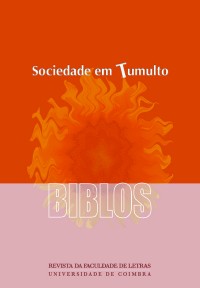Please use this identifier to cite or link to this item:
https://hdl.handle.net/10316.2/32739| Title: | Deslocamentos sociais e formação discursiva do sem-terra | Authors: | Fernandes, Cleudemar Alves | Keywords: | Discursive Formation;Landless People;Social Interaction;formação discursiva;sem-terra;interacção social | Issue Date: | 2009 | Publisher: | Faculdade de Letras da Universidade de Coimbra | Abstract: | This study seeks to explain the discursive formation of a group of
landless people of the Minas Triangle, in Brazil, based on the interaction of
these subjects with other social groups who are for or against the “Movement
of Struggle for Land.” The material used in the analysis was obtained from
interviews that were recorded at the site, and is characterized by spontaneity
and interaction between the interviewer and the respondents. The analysis of the
discourse focuses on spatial and temporal deictics, taking into consideration the
fact that these linguistic categories emerge from interaction at different times and socio-physical locations, revealing the construction of their history as well
as their discursive and ideological formation. The theoretical underpinning of
this study is provided by the French approach of Discourse Analysis, and the
analysis was carried out based on the conditions in which the discourse was
produced. Discourse is understood as a result (product) of social interaction of
the subjects involved and, thus, enables interaction. The article discusses the
ideological and discursive formation of the verbal social interaction of landless
people, taking into account its socio-historical production (which also involves
discourse production). Esta pesquisa procura explicar a formação discursiva de um grupo de sem-terra do Triângulo Mineiro – Brasil, baseada na interacção desses sujeitos com outros grupos sociais contrários ou favoráveis ao “Movimento de Luta pela Terra”. O material usado nesta análise foi obtido em entrevistas gravadas in loco e caracteriza-se pela espontaneidade e interacção entre o entrevistador e os interpelados. A análise do discurso foca-se nos deícticos espaciais e temporais, levando em consideração que estas categorias linguísticas se revelam através da interacção em diferentes momentos e localizações sociofísicas, revelando a construção da sua história além da sua formação discursiva e ideológica. A teoria em que se baseia este estudo é a da perspectiva francesa da Análise do Discurso, levada a cabo nas condições em que o discurso é produzido. O Discurso é entendido como o resultado de uma interacção social dos sujeitos envolvidos e, assim, permite a interacção. A interacção verbal em sociedade, no caso dos sem-terra, tendo em consideração a sua produção físico-sociais (que envolve também a produção do discurso), é discutida na sua formação ideológica e discursiva, que são práticas únicas no quotidiano desses sujeitos. |
URI: | https://hdl.handle.net/10316.2/32739 | ISSN: | 0870-4112 | DOI: | 10.14195/0870-4112_7_10 |
| Appears in Collections: | Biblos |
Files in This Item:
| File | Description | Size | Format | |
|---|---|---|---|---|
| biblosvii_artigo10.pdf | 494.7 kB | Adobe PDF |  |
Items in DSpace are protected by copyright, with all rights reserved, unless otherwise indicated.
